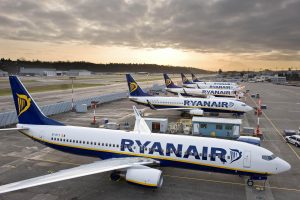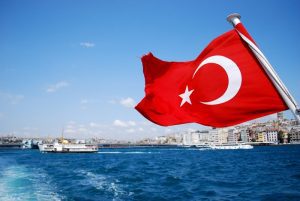
The Cabinet of Ministers of Ukraine expects the resumption of economic growth from the third quarter of 2020, Prime Minister Denys Shmyhal has said.
“We have macro forecasts of the Ukrainian economy from the Ministry of Economy, the IMF, the World Bank. All of these macro forecasts are converging. We expect the growth of the Ukrainian economy from the third quarter. Naturally, the second quarter failed due to quarantine,” the prime minister said during a press conference in Kyiv.
He called the economic situation complicated, however, according to him, the government does not expect surprises that will provoke a breakdown of the economy.

The Irish low cost airline Ryanair (Dublin) has announced the resumption of more than 20 flights to/from Ukraine from July 1 as part of the company’s summer schedule for 2020. According to the company’s press service, some selected routes will be available from the last week of June.
“We are proud to serve four airports in Ukraine, we are looking forward to the reunion of friends and families and the attraction of thousands of tourists, which will help boost the region’s economy and protect thousands of jobs. This is also an opportunity for customers whose spring flights were canceled due to travel restrictions because of coronavirus and who want to redeem their Ryanair vouchers,” Olga Pawlonka, the company’s sales and marketing manager for Central and Eastern Europe and the Balkans, said.
Earlier, Ryanair announced plans to resume 40% of all its flights from July 1, which will cover approximately 90% of the route network that operated before the crisis caused by the coronavirus pandemic.

Due to lockdown restrictions in April-May 2020, some 55% of car owners reduced the number of trips made with a privately owned car, while 26% of respondents reduced the number of trips by more than 40%, according to the results of a sociological survey conducted by Factum Group on demand of A-95 Consulting Group, the group said in a press release.
In addition, Factum Group conducted the sociological survey in three stages, namely, at the end of March, when lockdown restrictions were the strictest, in April and May, when the population’s activity began to increase sharply.
At the beginning of the survey, the number of respondents who reduced fuel consumption by personal vehicles was 46.4%, this figure increased to 55% in May.
A fifth of the car owners surveyed said that lockdown did not affect the intensity of personal vehicles’ use. However, some 24% of respondents, on the contrary, increased the number of trips for that period.
According to the results of the Factum Group survey, more than half of the respondents positively evaluated the safety measures taken by filling station’s operators during lockdown.
In addition, Factum Group studied consumer sentiment, according to which the price remains the key criterion for choosing filling stations for 44% of car owners. About a third of the respondents are ready to change the usual operator of fuel station in case of a difference in price from UAH 3 to UAH 5 per a liter. A quarter of respondents value the brand of the filling station chain and its reputation the most.
According to the analysts of the A-95 Consulting Group, the price gap that has developed between different filling station chains, largely redistributed sales.”Lockdown in Ukraine has strengthened the polarization of petroleum products consumers, namely, already 44% of car owners are ready to change the usual filling station to cheaper one, while traditionally this figure does not exceed 30%. According to our data, the filling station chains, which are discount stations lost less the volume of sales compared to brand chains with high price positions,” the group said in the press release, citing analyst at A-95 Consulting Group Artem Kuyun.

From July 1, Anex Tour, the tour operator, will resume daily flight program to Turkey and Azur Air Ukraine will operate flights to Bodrum and Antalya, the tour operator’s press service said on Wednesday, June 10.
The company said that following a phone conversation between the foreign ministers of the two countries, Turkey will open borders for tourists from Ukraine from July 1. The Turkish party said that it will create all the necessary conditions for the safe vacation of Ukrainian citizens in the summer.”
“Turkey, which tops our destinations, will welcome guests from July 1 of this year. It has become an exemplary country in the world, which implemented all the necessary safety measures for tourists and tourism in general. Therefore, we are planning to launch charter flights with Azur Air Ukraine, surely, observing all the rules of safe air travel,” the company’s press service said, citing General Director of Anex Tour Ukraine Ilker Adıgüzel.

Consumer prices in Ukraine in May 2020 increased 0.3%, while in March and April they rose by 0.8%, the State Statistics Service said on Tuesday.
In May 2019, price growth was higher – 0.7%, therefore, inflation in April 2020 year-over-year slowed to 1.7% from 2.1% in April, 2.3% in March, 4.1%.
According to the State Statistics Service, underlying inflation in May this year fell to 0.1% from 0.4% in April and the jump to 1.3% in March, whereas before that it had been falling for three consecutive months. Last May, underlying inflation was at the level of 0.2%, as a result, year-over-year it slowed down to 3%.
In May, prices for food and non-alcoholic beverages rose by 1.2% in the consumer market. Most of all prices of eggs and fruits went up (by 16.6% and 15.8%). Prices for grain processing products, rice, fish and fish products, and vegetables increased 2.3-0.8%. At the same time, meat and meat products, lard, butter, sugar, sunflower oil, sour-milk products, milk fell in price by 1.6-0.2%.
Prices for alcoholic beverages and tobacco products increased 1.1%, which is linked to a rise in price of tobacco products by 2.0%.
Clothing and shoes prices fell by 1.4%, in particular, clothing – by 2.0%, and shoes – by 0.7%
The decrease in prices (tariffs) for housing, water, electricity, gas and other types of fuel by 2.8% was mainly due to the reduction in the price of natural gas by 16.8%.
Transport prices decreased 2.0%, primarily due to cheaper fuel and lubricants by 8.6%.
The National Bank of Ukraine at the end of January improved its inflation forecast for 2020 from 5% to 4.8%, but in April it worsened this indicator to 6%.
According to the central bank, in the first half of this year, inflation in annual terms will be 4.8%.

The Ukrainian Wind Energy Association (UWEA) and the European-Ukrainian Energy Agency (EUEA) have signed a memorandum of understanding (MoU) with the Ukrainian government regarding the improvement of conditions of support of renewable energy producers, UWEA Board Chairman Andriy Konechenkov has said.
“The memorandum was signed on the basis of voluntary restructuring,” Konechenkov said after signing.
At the same time, according to him, the Ukrainian Association of Renewable Energy (UARE), which participated in the negotiations, refused to sign the memorandum because of disagreement with the government’s position regarding the further development of solar energy, in particular, the termination of the existing system for supporting SES in the form of feed-in tariffs on July 31, 2020.
“Premier Shmyhal gave the UARE another day to talk with members of the association,” Konechenkov said.
“I turned to the prime minister with a proposal to meet the challenges of solar generation, but he, as well as the MPs from the Rada energy committee who were present during the talks, said that this is the maximum that we managed to agree with the majority of the MPs and the relevant ministries. This is the option for the memorandum,” Konechenkov said.
At the same time, he said that, in his opinion, there will be no stopping of solar projects due to the termination of the feed-in tariffs for them, since all [companies] will go to green auctions.